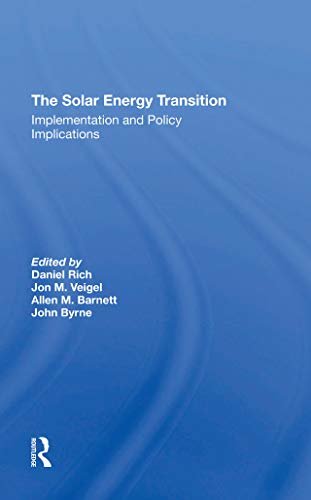
The Solar Energy Transition: Implementation And Policy Implications (English Edition)
- 作者
- Daniel Rich、Jon M Veigel、Allen M Barnett、John Byrne
- 语言
- 英语
- 出版社
- Routledge
- 出版日期
- 2019年7月11日
- 纸书页数
- 186页
- 电子书格式
- epub,pdf,mobi,azw3,txt,fb2,djvu
- 文件大小
- 2880 KB
- 下载次数
- 7930
- 更新日期
- 2023-07-31
- 运行环境
- PC/Windows/Linux/Mac/IOS/iPhone/iPad/iBooks/Kindle/Android/安卓/平板
内容简介
Solar energy is considered by many an attractive and practical option for America's energy future, one that is technically and commercially feasible as well as socially and environmentally desirable. Sun-generated power could meet upwards of 20 percent of U.S. energy needs by the year 2000—but only if there is a concerted national effort to use this energy option. The issues of implementation and the public and private initiatives needed to facilitate a transition to extensive use of solar energy are the focus of this volume. The solar transition is addressed from the diverse perspectives of the many necessary participants: industries and small businesses; local, state, regional, and federal governments; public utilities; policy analysts; and solar advocates. The contributors assess the extent to which solar alternatives can replace and augment other energy forms, the pace and pattern for solar commercialization, and the roles of public and private institutions in carrying out the transition. A consensus becomes apparent: Although the transition to solar energy is technically and commercially viable, its success depends on concerted public and private efforts to promote innovation and diversification in energy production and distribution and to institute major changes in public policy related to energy use.
The Solar Energy Transition: Implementation And Policy Implications (English Edition) EPUB, PDF, MOBI, AZW3, TXT, FB2, DjVu, Kindle电子书免费下载。
- Harriet Spies Again (English Edition) Louise Fitzhugh、Helen Ericson
- The Gypsy Game (English Edition) Zilpha Keatley Snyder
- 中国足球振兴论 足球鬼谷
- The Black Pearl (English Edition) Scott O'Dell
- The King of the Golden River (免费公版书) (English Edition) John Ruskin、Iassen Ghiuselev
- 见证奇迹的人生(附扑克牌) author
- 高效能人士的七个习惯(25周年纪念版)(第八章) 史蒂芬•柯维 (Stephen R. Covey)、高新勇 王亦兵 葛雪蕾
- The Navy and German Power Politics, 1862-1914 (Routledge Library Editions: German History Book 29) (English Edition) I. N. Lambi
- The Medieval Foundations of England (Routledge Library Editions: The Medieval World Book 47) (English Edition) G.O. Sayles
- Stand Tall, Molly Lou Melon (English Edition) Patty Lovell、David Catrow
- The Silent Dictatorship: The Politics of the German High Command under Hindenburg and Ludendorff, 1916-1918 (Routledge Library Editions: German History Book 27) (English Edition) Martin Kitchen
- All About Sam (English Edition) Lois Lowry
- European and Non-European Societies, 1450–1800: Volume I: The Longue Durée, Eurocentrism, Encounters on the Periphery of Africa and Asia (Routledge Revivals) (English Edition) Robert Forster
- Amber the Orange Fairy: The Rainbow Fairies Book 2 (Rainbow Magic) (English Edition) Daisy Meadows、Georgie Ripper
- The Bed and Breakfast Star (English Edition) Jacqueline Wilson、Nick Sharratt
- Operation Just Cause: The U.s. Intervention In Panama (English Edition) Bruce W. Watson、Peter Tsouras
- The Middle East Since Camp David (English Edition) Robert O Freedman
- Wringer (English Edition) Jerry Spinelli
- The Idea Of Race (English Edition) Michael Banton
- Autumn Story (Brambly Hedge) (English Edition) Jill Barklem
- The Hope Chest (English Edition) Karen Schwabach
- 世界顶级篮球赛事——NBA 曾微隐
- Harry Potter: Collectible Quidditch Set Running Press
- Stars and Sparks on Stage (Clubhouse Mysteries Book 6) (English Edition) Sharon M. Draper、Jesse Joshua Watson
- Sarah, Plain and Tall (Sarah, Plain and Tall Saga Book 1) (English Edition) Patricia MacLachlan
- Middle English Literature: A Critical Study of the Romances, the Religious Lyrics, and Piers Plowman (Routledge Library Editions: The Medieval World Book 24) (English Edition) George Kane
- The Crime Conundrum: Essays On Criminal Justice (English Edition) Lawrence M. Friedman、George Fisher
- Crystal The Snow Fairy: The Weather Fairies Book 1 (Rainbow Magic) (English Edition) Daisy Meadows、Georgie Ripper
- The Tail of Emily Windsnap: Book 1 (English Edition) Liz Kessler、Sarah Gibb
- Telecommunications Structure and Management in the Executive Branch of Government 1900-1970 (English Edition) Thomas E. Will